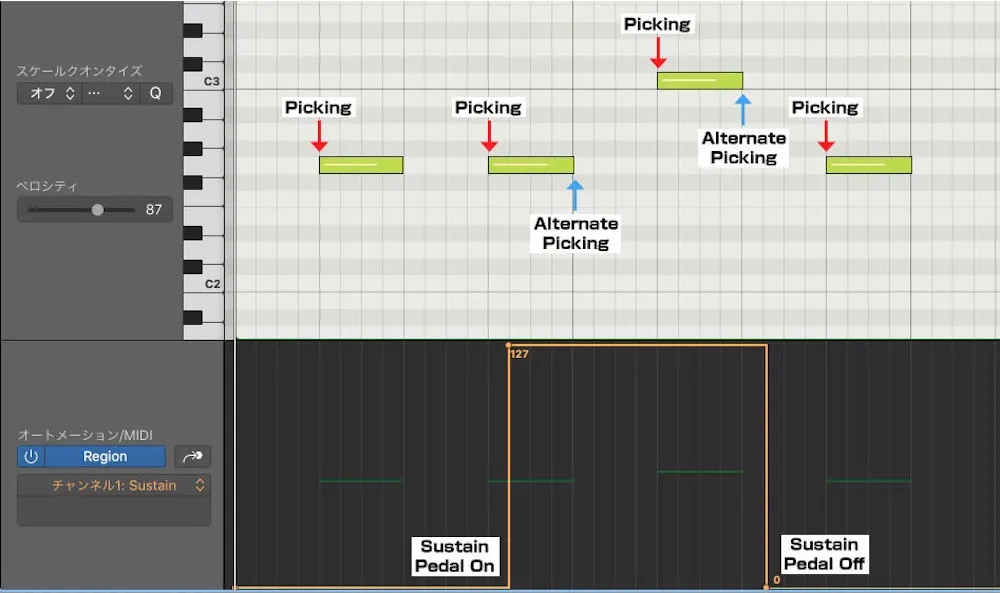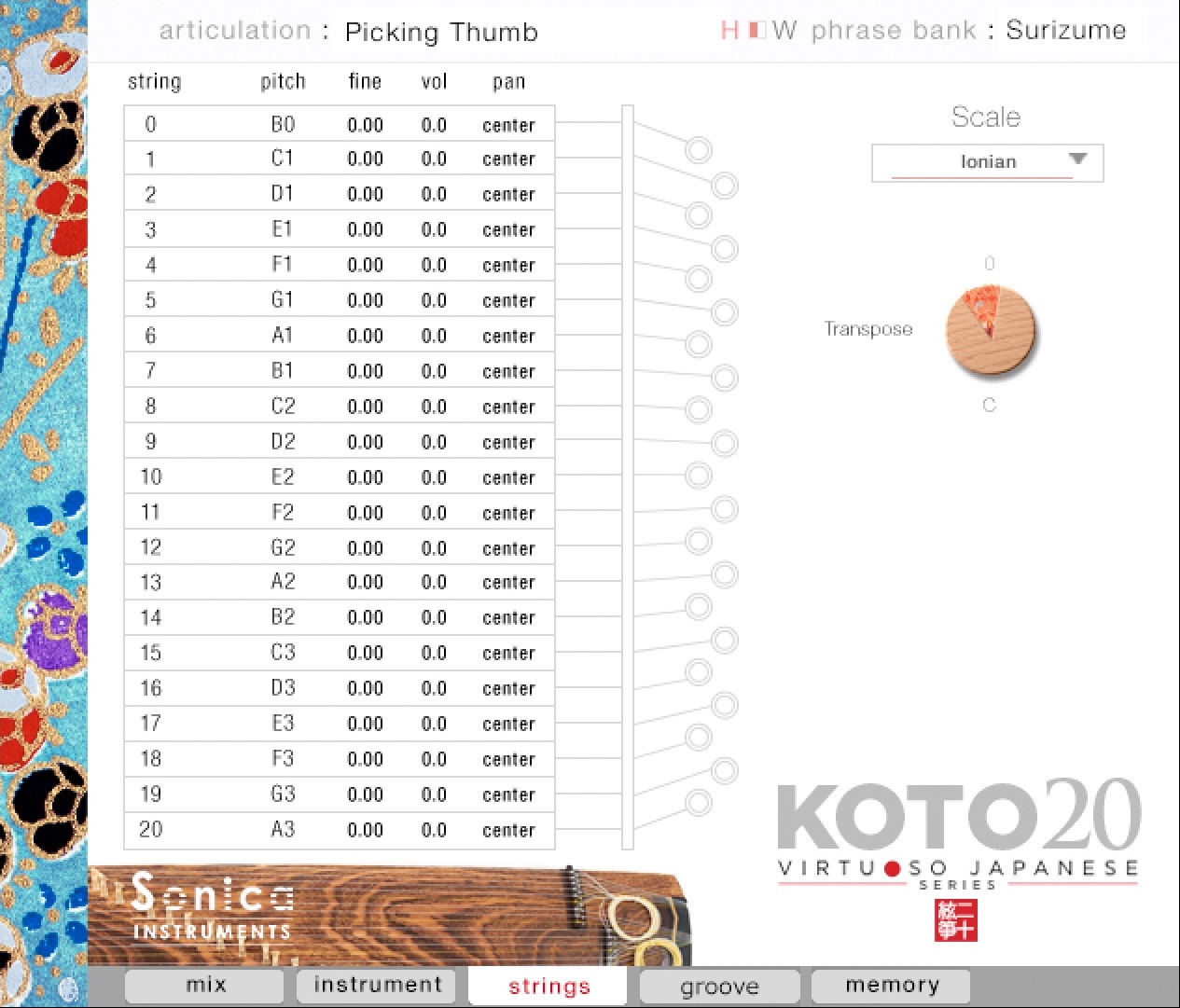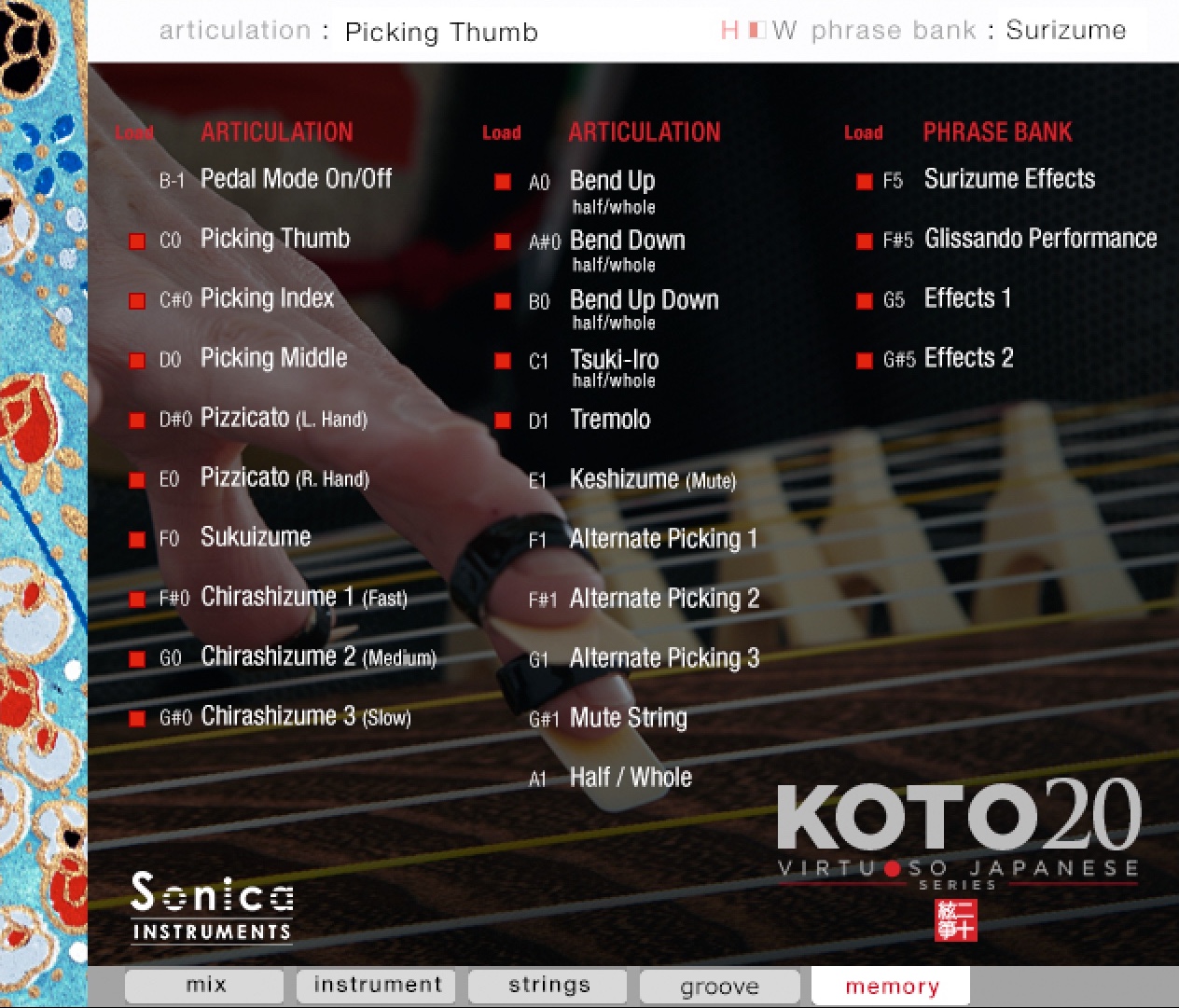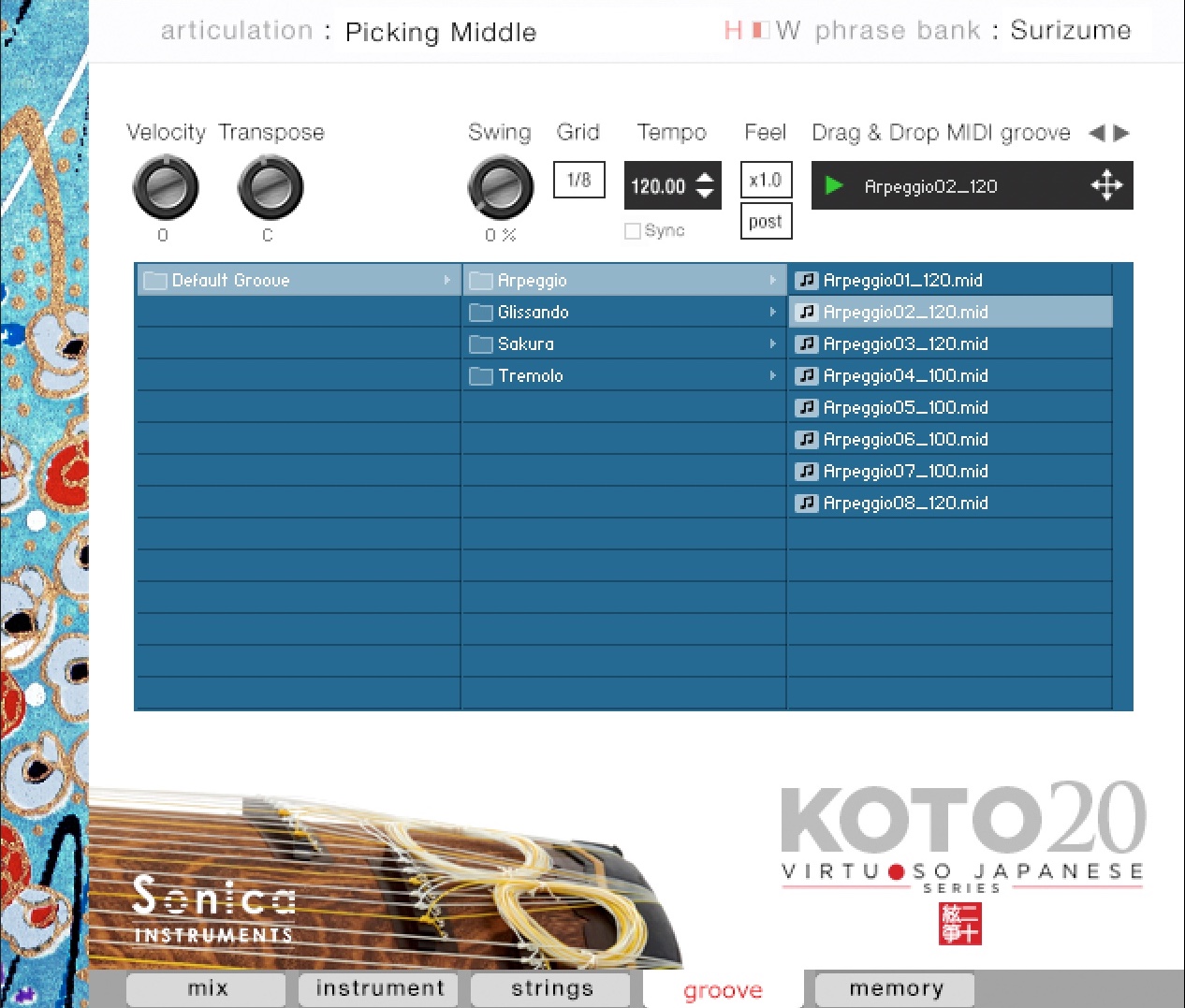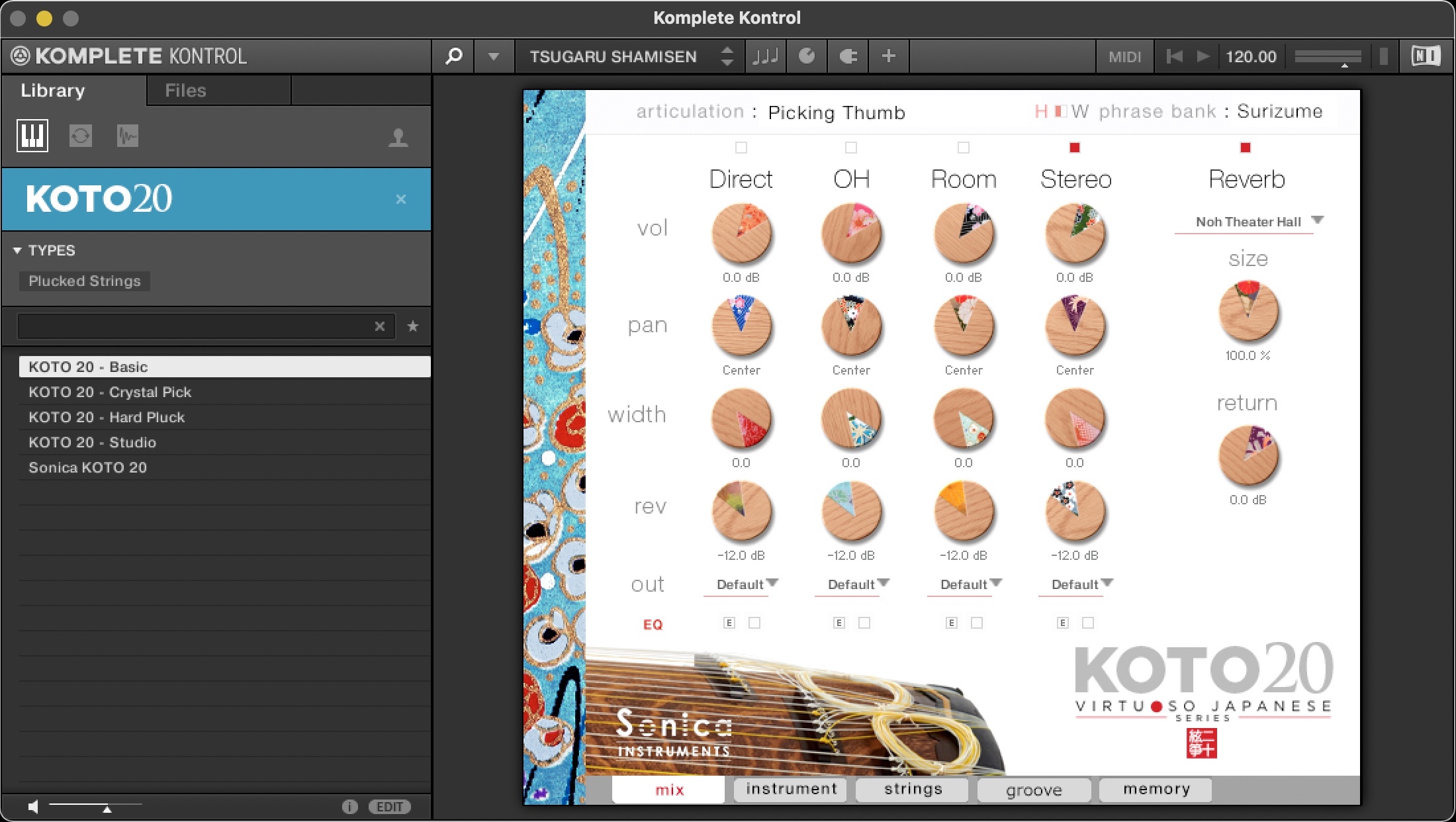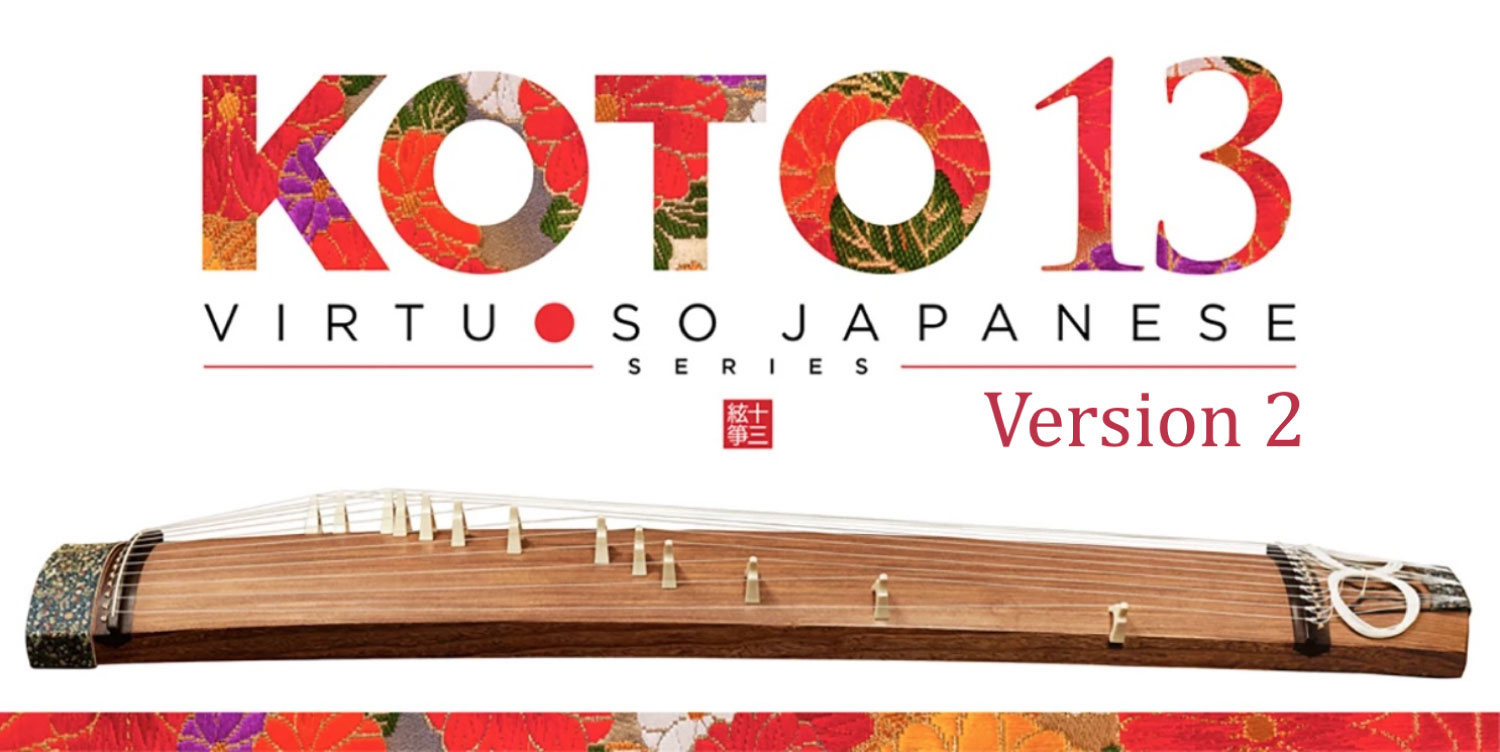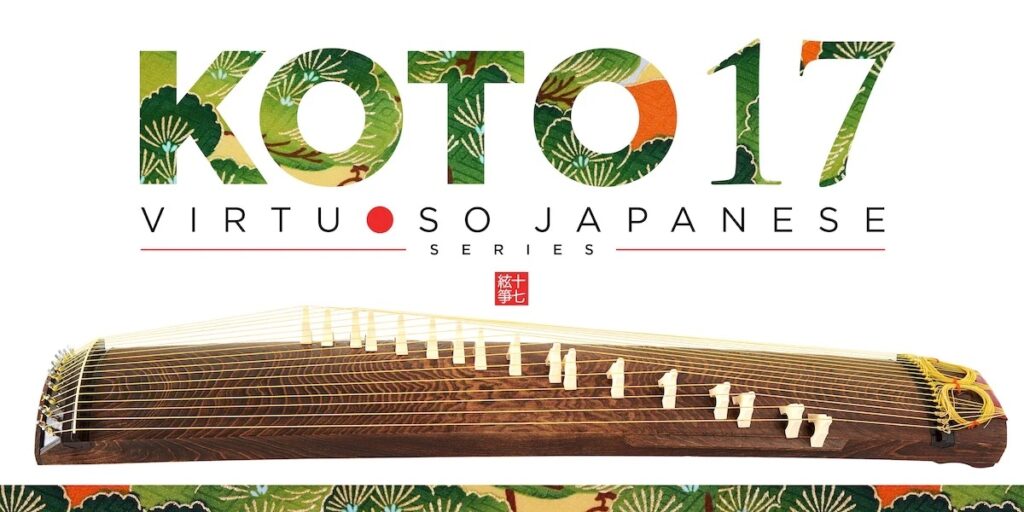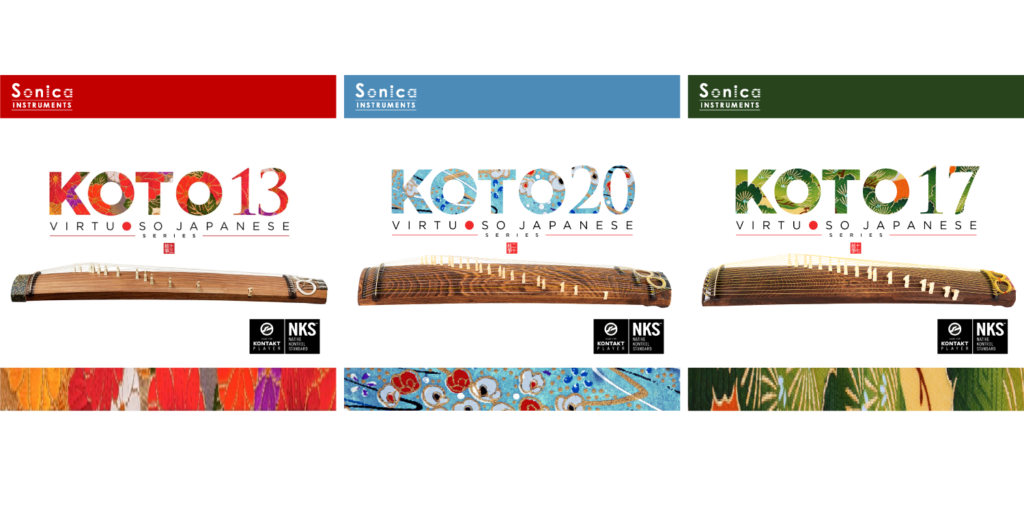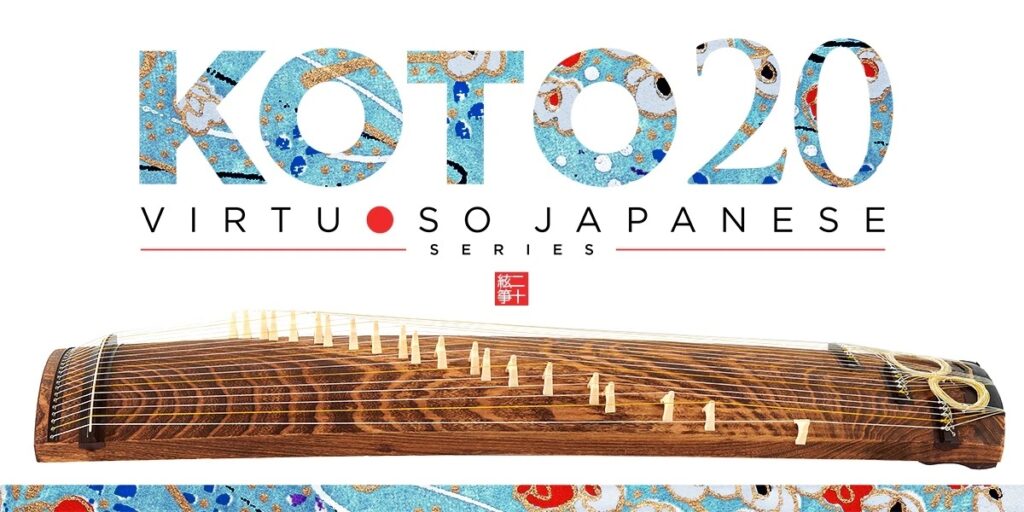
The library can naturally be used on its own. But when combined with other titles from the Virtuoso Japanese Series — such as KOTO 13 Version 2, KOTO 17, or SHAKUHACHI — as well as orchestral instruments, KOTO 20 can complete a rich and broad ensemble.
As a historical note, the 20-string koto was conceived by Keiko Nosaka in 1969. Initially, this koto was strung with 20 strings, but in later iterations, another string was added to make it a 21-string instrument.
Main Features
- NKS ready and Kontakt Player compatible.
- Near-perfect recreation of every performance nuance from the 21-string koto thanks to meticulous recording techniques and innovative programming.
- Exclusive Performance mode maps the 21 strings to adjacent white keys for easy performance of real koto glissandos and phrases.
- 18 key-switch-selectable articulations fundamental to the 21-string koto.
- Sustain pedal control for natural continuous-picking phrasing.
- Newly developed Instrument Modeler reproduces sound variations due to different fingerpicks and strings.
- Character selector lets you choose from three fingerpick thicknesses.
- String tone selector offers three string tones: Thick, Normal, and Thin.
- Includes three banks of quintessential koto phrases, all key-switch controllable.
- Plucking control function for full mastery over subtle, natural sounding picked notes.
- String editor enables independent tuning adjustments for all 21 strings.
- In addition to the 10 preset scales, the User Scale mode lets you create original scales.
- All samples recorded in 24-bit / 96 kHz high resolution to capture every tonal detail.
- Create your own mixes with the multi-microphone samples and a dedicated mixer with individual controls for Direct, Overhead, Room, and Stereo Mix channels.
$260
$260 $169
Special sale price available until January 25, 2026.

Product Specifications
- Kontakt Player 6.6 and higher.
- Native Access compatible
- Data size:11.2 GB
User manual
Designed to capture the sound and expressive power of the 20-stringed koto.
String editor enables independent tuning adjustments for all 21 strings. The koto is played by adjusting the tuning of the 21 strings for each musical piece to be performed. KOTO 20 has a Scale Performance mode to map the tones of each string to 21 adjacent white keys. This lets the performer access the instrument in the most realistic way possible.
KOTO 20 is packed with 18 different articulations to recreate the koto’s vast range of musical expressions. These include different nuances created by playing with the thumb, index, or middle finger as well as glissandos, tremolo picking, and even chirashizume pick scrapes. All articulations can be controlled independently with key switches.
The three KOTO 20 phrase banks contain special techniques that are difficult to reproduce, ranging from classic koto techniques such as glissandos and surizume to sound effects made by striking the bridges. Phrase banks are selectable with key switches and can be triggered from a MIDI keyboard. You can control the pitch and tempo of each phrase bank as well.
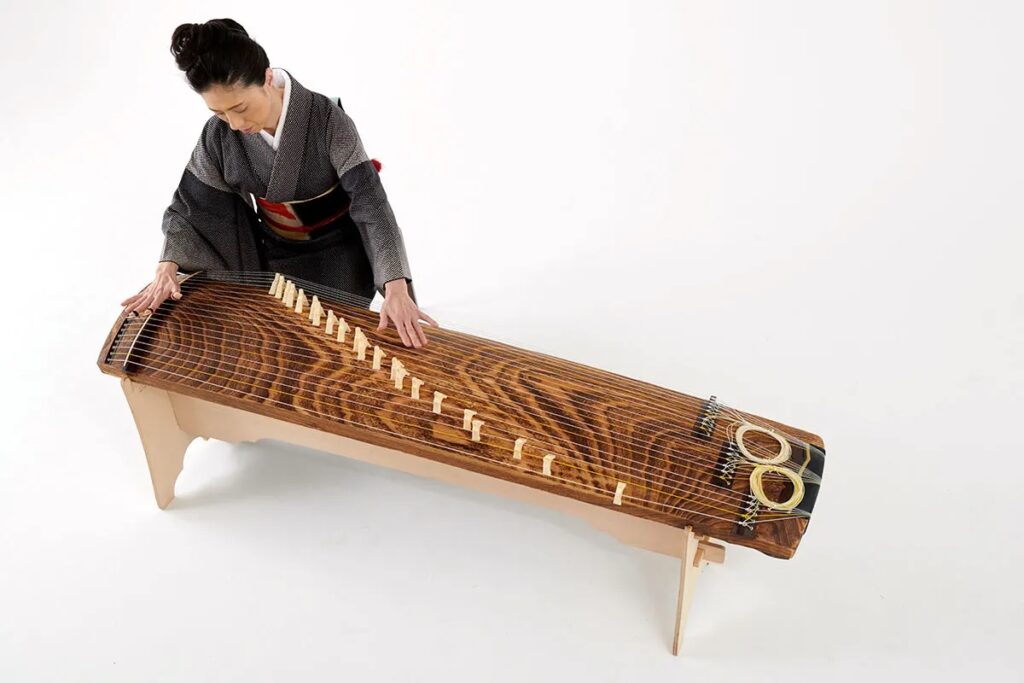
Instrument Modeler reproduces sound variations from different fingerpicks and strings
The tonal characteristics of the koto vary a lot depending on the fingerpick and string thickness used. To faithfully reproduce these variations, we developed a new function called the Instrument Modeler.
With the Instrument Modeler, you can adjust individual parameters, including the fingerpick and string thickness (Thick, Normal, and Thin), the pitch and attack of note transients, and noise components. This functionality makes it possible to control the character of the sound any way you like, from a natural playing feel to very aggressive performances.
Alternate picking articulations and sustain pedal control for natural continuous-picking phrasing
The library comes with three alternate picking articulations to recreate the natural sound variations that occur while playing a succession of pick strokes. Alternate picking can be switched with key switches or the sustain pedal control. This function makes it easy to reproduce realistic tremolo picking.
With the sustain pedal control on, you can switch between normal picking with key on events and alternate picking with key off events.
String editor enables independent tuning adjustments for all 21 strings
The library comes with 10 frequently used scales (Chromatic, Ionian, Natural Minor, Harmonic Minor, Melodic Minor, Dorian, Phrygian, Lydian, Mixolydian, Whole Tone), including a chromatic scale. You can perform many musical pieces with the presets and the key transposition function. The additional User Scale mode lets you create custom scales for specific compositions. When creating a custom scale, you can set the volume and panning for each string as well as fine tune each string.
○User scales
By customizing all 21 strings, you can set up scales for specific tunes or for your original compositions, allowing you to incorporate koto elements into any piece of music. Custom scales are saved as user scales and can be recalled at any time.
Note: User scales cannot be transposed.
Multi-microphone samples
in full 24-bit / 96 kHz high resolution
The recordings were made with the utmost care, using more than eight microphones of various types together with colorless mic preamps. All library samples were recorded in 24-bit / 96 kHz high definition to faithfully capture the entirety of the koto’s delicate expressions.
The samples were recorded with three stereo microphone positions — Direct, Overhead, and Room — plus a Stereo Mix. Full mixing control is available, with individual Volume, Pan, Reverb Send, and EQ adjustments for each channel. The parallel output bus sends the microphone channels to individual DAW tracks for finer mixing sessions.
The library comes with 30 convolution reverbs, including two impulse responses from a Noh theater renowned among musicians for its acoustics. The convolution reverbs permit high-quality in-instrument sound creation.
Load manager reduces memory usage for smoother production work
With the load manager, the performer can choose to load only the desired articulations. Skipping unnecessary samples obtains smoother performance from the Kontakt engine.
MIDI Groove Browser
KOTO 20 features the incredibly useful Groove Browser, that lets you quickly find MIDI grooves and drag & drop grooves directly into your DAW.
You can adjust the grooves’ velocity, swing, playback tempo, and other parameters directly from KONTAKT / KOMPLETE KONTROL.
The library comes standard with 20 MIDI grooves, including short phrases that showcase what the instrument is capable of. When combined with the soon-to-be-released Groove Inspirations MIDI pack, the Groove Browser gives you access to an extensive phrase bank.
Comes with NKS & Native Access support
KOTO 20 is NKS compatible so it can be used with Kontakt Player, Kontakt Full (Ver. 6.6 or newer), and Komplete Kontrol.
When KOTO 20 is linked with a Komplete Kontrol keyboard or other NKS-compatible hardware, you can quickly preview tones and make full use of the hardware’s knobs and controllers.
Product Specifications
| Format | Free KONTAKT PLAYER version 6.6 and higher, or KONTAKT version 6.6 and higher. |
| Data size | ~11.2 GB NCW format (equivalent to 24.88 GB in wav format) |
| System Requirements | See the Native Instruments website for the latest system requirements for KONTAKT and KONTAKT PLAYER. |
| User manual | Online Manual |
Performer
Miki Maruta

While proficient in an array of musical categories, from classical Japanese music to contemporary compositions, Miki Maruta has always pursued the koto’s natural voice. This approach, together with her willing adaptability and inclusive emotional sensitivity, has contributed to her success in collaborating with artists across genres and borders.
After passing the demanding NHK Japanese music audition, she went on to teach at Wesleyan University in the United States as a visiting instructor in music from 1990 to 1992. In 1994, Miki Maruta was selected for an internship in the performing arts at the Agency for Cultural Affairs and in 2009, she performed with Terry Riley and the Kronos Quartet at Carnegie Hall in New York.
She has released a solo album Tori no yo ni (Like a Bird) on King Records and been featured on numerous artists’ CD releases. She even appeared in a TV ad for Ayataka green tea. Miki Maruta has published many popular arrangements of koto music played on a five-note scale.
Miki Maruta studied under Tadao Sawai and Kazue Sawai and graduated from the Takasaki College of Music with top honors. She is currently a professor at Sawai Koto Academy and a part-time lecturer at Mie University.
Related Products
KOTO 17
A Kontakt library reproducing the rich and subtle tones of the 17-string koto, an essential instrument for contemporary Japanese music
$260
KOTO
Three Sisters
This is a special limited time offer bundle of KOTO13 Version 2, KOTO17 and KOTO20.


